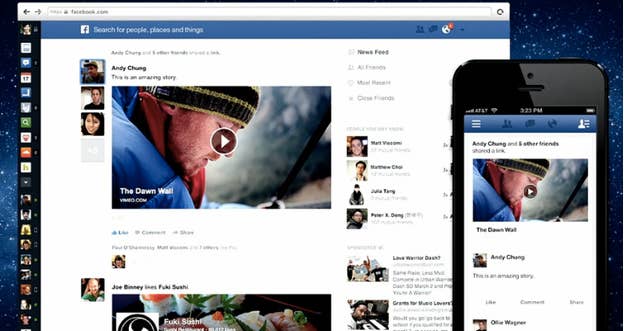
Starting today, Facebook will undergo a subtle but critical change as it continues its quest to make a meaningful business of the world's most expansive social network.
The company announced this afternoon that retargeted ads bought through FBX — Facebook's ad exchange — will begin to appear in users' New Feeds, allowing advertisers to match ads to browsing behavior, not just activity inside Facebook (the way most other, non-social-network sites deliver display advertising, in other words). Previously, retargeted ads could only be found on Facebook's right rail, where banner-blind users could ignore them altogether.
It's a rational step for the network, which rolled out a cleaner, News Feed–centric design earlier this month. The redesign, which expanded News Feed's real estate on the site, leaves ample space for larger ads, and Facebook is wasting no time giving companies more access to this coveted property.
But for Facebook, which has struggled to convey and implement a truly successful ad system capable of making money from its billion-plus users, the move is an admission that its initial reliance on a user's social graph to deliver meaningful ads — the core of its pre-IPO pitch — is not enough. It's also an admission that the News Feed is where the money is.
This represents a very real shift for Facebook, and for its users too. Users started as both the source of and audience for the site's content, and willingly provided the information necessary to deliver it in a relevant way. But just last month, Facebook announced partnerships with four big data aggreagation companies to hone its ability to target ads to users using outside data, a noticeable change from past years, when the company touted its own trove of user data — "The Graph" — as its biggest asset, and one that could give it absolute primacy as an ad platform.
The hard truth for Facebook is that it doesn't know its users as well as it had hoped, and, in some ways, not as well as third-party identity aggregators like Acxiom. For users, this means that the Facebook experience could begin to shift; the site will start to look and feel a whole lot like every other ad-supported site on the internet — the internet that the site, in many ways, had hoped to replace. As BuzzFeed's own Katie Notopoulos put it on Twitter, "it basically makes Facebook into just A Website That People Visit A Lot."
While Facebook is careful to note that adding outside ads to the News Feed won't change the frequency with which ads appear, the decision to inject retargeted ads into the formerly sacrosanct space is a clue that a post-IPO Facebook isn't afraid to be bolder in its attempts to extract money from its billion-strong user base.
Now, with Facebook beholden to stockholders, users might need to start getting comfortable with the idea of being "monetized," which means an end of Facebook's self-contained internet experience. The company has spent the better part of its existence gathering data and building one of the most comprehensive networks to date while trying to maintain its image as a pure social network instead of what it was always destined to be: a business.
